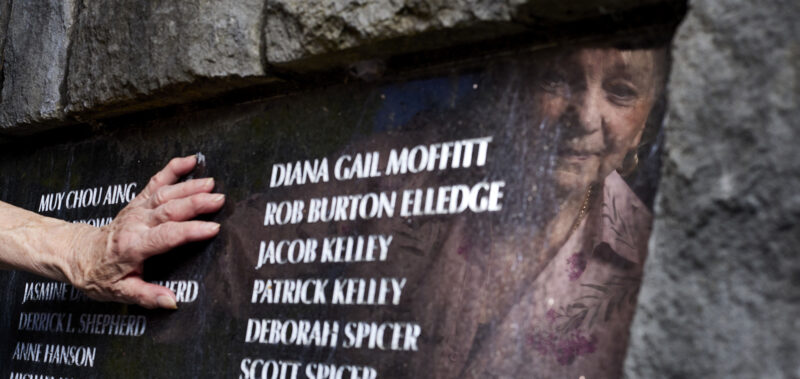Reporter Gillian Flaccus had been watching coverage of rising gun violence in Portland, Oregon, just as police staffing numbers were dropping due to pandemic burnout and general disillusionment in the profession after calls to defund the police and months of social justice protests. But a hook revealed itself while she reported a different law enforcement story on the shortage of public defenders: One of the crime victim advocates mentioned police were so short-staffed that sex crimes weren’t being investigated and the cold case unit had basically been shut down.
Flaccus set about trying to tell the story of reduced police ranks and rising gun violence through the eyes of real people who had suffered in ways large and small. It took weeks, but she finally tracked down and gained the confidence of the parents of a cold case victim whose case was pushed aside by rising gun homicides.
“To us, it’s not a cold case,” said George Spaulding, who has his son’s signature tattooed on his arm. “We’re not dissatisfied with the police bureau because I think they’re doing the best they can. … They are just overwhelmed. It’s insane.”

AP journalist Gillian Flaccus shoots video of a traffic stop during a ride-along with Gresham, Ore., police.
AP / Craig Mitchelldyer
Flaccus also shot video, including a rare sit-down with Portland’s police chief, and convinced police in a Portland suburb that sees running gun battles to do a ride-along. She went out over several days, reporting in text and video, working closely with AP freelance photographer Craig Mitchelldyer to tell the story in all formats.
Seeking to broaden the story, Flaccus reached out to colleagues Claudia Lauer in Philadelphia and Stefanie Dazio in Los Angeles for help showing that these issues aren’t specific to Portland. The journalists also spoke to activists who argued that despite the drop in police staffing, the rising crime figures couldn’t be addressed by law enforcement alone.
Lauer and photographer Matt Rourke went out with a community activist frustrated by a backlog of 30,000 complaints to police about quality-of-life issues in some low-income areas because officers had been shifted to violent hot spots.

Mary Elledge, head of the greater Portland chapter of Parents of Murdered Children, looks at the name of her son, Rob, on a memorial in Oregon City, Ore., July 20, 2022. Elledge, whose son was murdered in 1986 and the case unresolved for months, is opposed to resources being taken from cold case units to address the current rise in homicides. “The unsolved cases are where I see so much sadness,” Elledge said of the families she works with. “When they don’t get an answer, it’s like nobody cares and they never find out what happened.”
AP Photo / Craig Mitchelldyer
Los Angeles, which is down more than 650 officers from its pre-pandemic staffing level, shuttered its animal cruelty unit and downsized its human trafficking, narcotics and gun details and reduced its homeless outreach teams by 80%.
Dazio, working with LA video journalist Eugene Garcia and photographer Damian Dovarganes, found that the problem had deeply impacted police outreach to people on the street. She also provided a critical counterpoint from homeless advocates.
Garcia artfully stitched together elements from Portland; Gresham, Oregon; Los Angeles; and Philadelphia to tell the story for video.
The package appeared in numerous news outlets across the country and both USA Today and ABC News used the video in its entirety.







